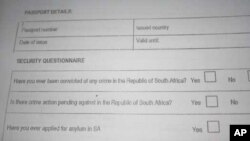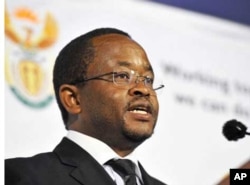Many human rights monitors are convinced the South African government is committed to expelling as many Zimbabweans as possible, as soon as possible.
“Their harsh words recently seem to prove this. The announcement that they’re going to be deporting people next year is one that gives them the opportunity to deport very large numbers of people,” says Braam Hanekom, the founder of Cape Town-based refugee rights group, People Against Suffering, Suppression, Oppression, and Poverty.
New immigration legislation says only Zimbabwean migrants who the South African authorities establish are working, studying or owning businesses in South Africa, and who apply for revised residence permits by December 31 and are granted the documents, can remain in the country legally.
“We expect everyone, whether you are a foreigner or a South African, to abide by our laws…. And anyone who flouts the law will have to face the consequences,” says Jackie McKay, chief of immigration and one of the Home Affairs officials driving the state’s “Zimbabwean Regularization Project.”
The “consequences” McKay speaks of are arrest and expulsion from South Africa of all Zimbabweans who do not have the “correct” residence papers. “If you are in the provinces you are deported through the point of entry nearest to your province. If you are arrested elsewhere you will be taken to our holding center at Lindela (near Krugersdorp in Gauteng province) and from there you will be transported back to Zimbabwe,” he explains.
Up until now, the South African authorities have allowed “illegal” Zimbabweans to remain in the country under a “special dispensation.” This policy – widely praised by international human rights advocates – took into account the intense political and economic instability in Zimbabwe.
But the revised regulations governing migrants from the country north of the border, where unemployment is more than 80 percent, have reversed this policy.
Hundreds of Zimbabweans cross into South Africa daily
“All indications so far are that the government of South Africa has completely lost patience with illegal immigrants, and Zimbabweans in particular,” says Hanekom.
McKay says South Africa indeed has a “huge problem” with illegal immigration. “Things can’t go on like this, with people just pouring over the border without consequence,” he states.
The latest United Nations Refugee Agency Global Report says South Africa continues to receive the largest number of asylum applications in the world, with 222,000 applications submitted in 2009 alone
According to analysis by South Africa’s main opposition party, the Democratic Alliance, 300 to 400 Zimbabweans arrive in South Africa every day. The International Organization for Migration estimates there are currently up to two million illegal Zimbabwean immigrants in the country. But Gabriel Shumba, a lawyer and director of the Zimbabwe Exiles Forum, says this figure’s “far too conservative…. I’d say it’s about double that.”
Amid the clamor of hundreds of thousands of people, mostly Africans, who are trying to settle in Africa’s strongest economy, McKay says South Africa must protect its interests. “Anywhere you go in the world, deportation is a way of controlling illegal immigration. That said, this is a documentation process, not a deportation process,” he says.
Hanekom responds, “We will try our best to hold the South African government to its word that this new process is a means to document Zimbabwean immigrants, rather than to get rid of most of them.”
Into the lion’s den
Tara Polzer, of Wits University’s Forced Migration Studies Program, says South Africa’s stricter policy regarding Zimbabweans will have several “very negative” effects on some migrants.
“That does include the potential for quite a few people being arrested and deported without really having had the chance of duly getting into the systems that are being offered, just because of bureaucratic issues, because of timing issues,” she explains.
“At this stage, a lot of Zimbabweans will be deported next year….There will be mass deportations,” says Austin Moyo, the leader in South Africa of the MDC, one of the parties that shares leadership in Zimbabwe’s government.
Shumba’s convinced this will be “a human rights and humanitarian catastrophe….Some (migrants) do not even have homes or jobs to go back to.”
The lawyer says other Zimbabweans who don’t qualify for the new residence documents fled to South Africa after suffering political persecution. Deporting them, Hanekom maintains, will be their “death sentence.”
Shumba agrees, saying, “It will be like throwing them into the lion’s den because they hold political opinions that are at variance with (President Robert Mugabe’s) ZANU-PF (party) and these people will be targeted – myself, for example.”
Monitors say in advance of a proposed election next year, heightened tension between the two main players in Zimbabwe’s unity government, Mr. Mugabe and the MDC’s Morgan Tsvangirai, sets the scene for intensified violence in the near future.
“With what we have seen during the constitutional outreach process, violence is going to be on the increase. It can even be dangerously higher than 2008,” says Shumba.
“The reality is that if there’s another election in Zimbabwe there’s no guarantee for the Zimbabwean people that they won’t be beaten up, they won’t be assaulted, they won’t be killed; that they won’t suffer the same kind of violence they suffered in (election) 2008,” says well-known Zimbabwean academic, Elinor Sisulu.
New policy won’t stop illegal immigration
McKay says he can’t comment on Zimbabweans’ fears of being forced back to their unstable homeland.
“All that I will say is that we have laws in South Africa. Our mandate as the Department of Home Affairs and more specifically the Department’s immigration section is to regularize movement into South Africa, and people need to have correct documentation for that. And that is internationally accepted. And that is what we will do, and that is what we will police,” he emphasizes.
Many Zimbabweans say if they’re deported, they’ll return to South Africa illegally as soon as possible. McKay says his government will respond by “stepping up military operations” on the border. “We believe that we will be doing enough to keep out people that want to enter South Africa illegally,” he says.
But Polzer says the South African authorities “just don’t have the capacity” to fully prevent illegal immigration from Zimbabwe. “The borders are so porous; even with all these extra army patrols, Zimbabweans are entering and leaving whenever they want and relatively few get caught,” she says.
According to Sisulu, “no matter what laws are made” migration from Zimbabwe to South Africa will continue for as long as Zimbabwe’s ravaged economy relies on US dollars and South African rands. “Where do people get access to that money, unless they work outside (of Zimbabwe)?” she asks.
Sisulu adds that illegal immigration will also carry on as long as there’s political violence in Zimbabwe. “The reality is that a fresh election is going to cause an outflow of people again (because of violence). The same people the South African government will deport are going to be heading back across the border to South Africa as soon as there’s another election.”
‘Genuine’ reform in Zimbabwe before deportations
Moyo says the MDC is advocating “a managed repatriation of Zimbabweans” living illegally in South Africa, rather than “a wave” of deportations. “We need foreign direct investment into Zimbabwe, to create fresh employment, which can absorb those people that are coming back into the country,” he says. “And that sort of big investment is going to take quite a long time, because the international community still has little confidence in Zimbabwe.”
Sisulu’s convinced the “real solution to uncontrolled Zimbabwean migration in South Africa is a genuine political solution in Zimbabwe which guarantees the security of the Zimbabwean people.”
When this happens, she maintains, “the natural consequence will be re-investment in Zimbabwe, and life will begin to improve for ordinary Zimbabweans. Such improvement on the ground will naturally stem the flow of migration into South Africa.”
Moyo also calls on South Africa to wait until there’s “true political reform” in Zimbabwe before deporting Zimbabwean migrants and to therefore extend its deadline for applications for new residence permits.
“We’ve got a pending election in Zimbabwe. We’re hoping that, because the next election will be run under a new constitution and a new electoral act and there will hopefully be credible international monitors, the election will be free and fair,” he says. “So we are saying to the South African government, at least wait until that election goes through.”
Only after the polls, says Moyo, will South Africa be in a position to make a “clear judgment” about whether or not it’s stable enough for Zimbabweans to return to their homeland.
If violence mars another Zimbabwean election, says Shumba, the South African authorities should suspend immigration reforms pertaining to Zimbabweans, and should exercise “leniency” with regard to Zimbabweans in South Africa illegally, “in the interests of basic human rights.”
But in the meantime, South Africa’s head of immigration is unmoved by all the controversy and comment surrounding the implications of the new policy.
Jackie McKay says both the Zimbabwean and the South African governments have agreed that all Zimbabweans in South Africa illegally “should now return home” and he has “no intention of backtracking” on this agreement.






